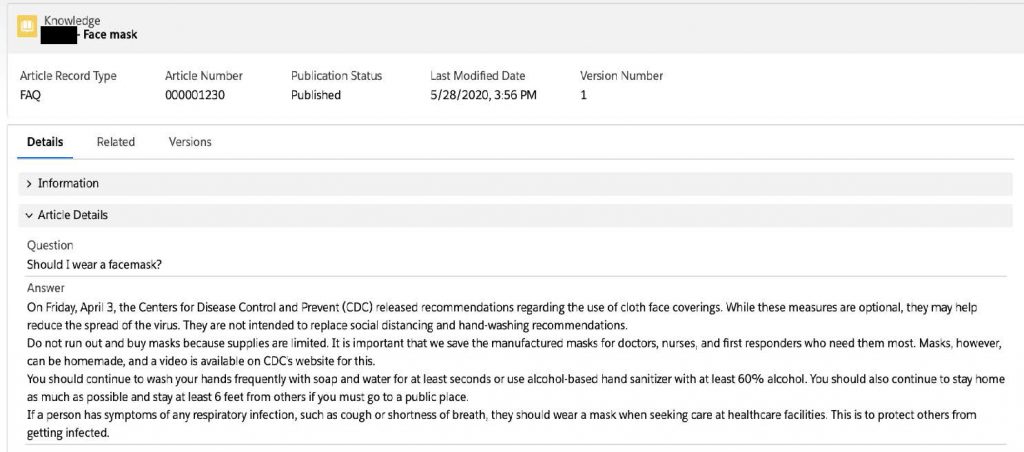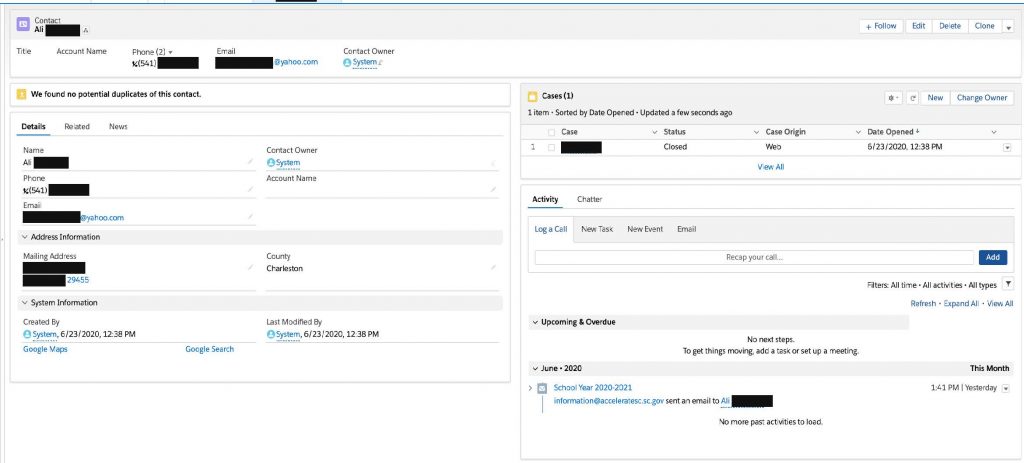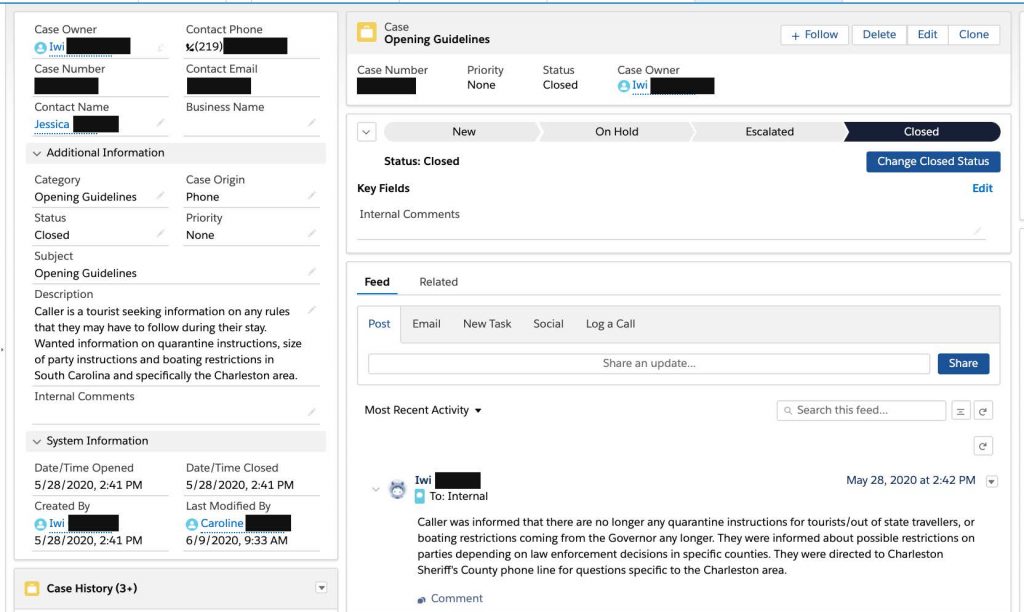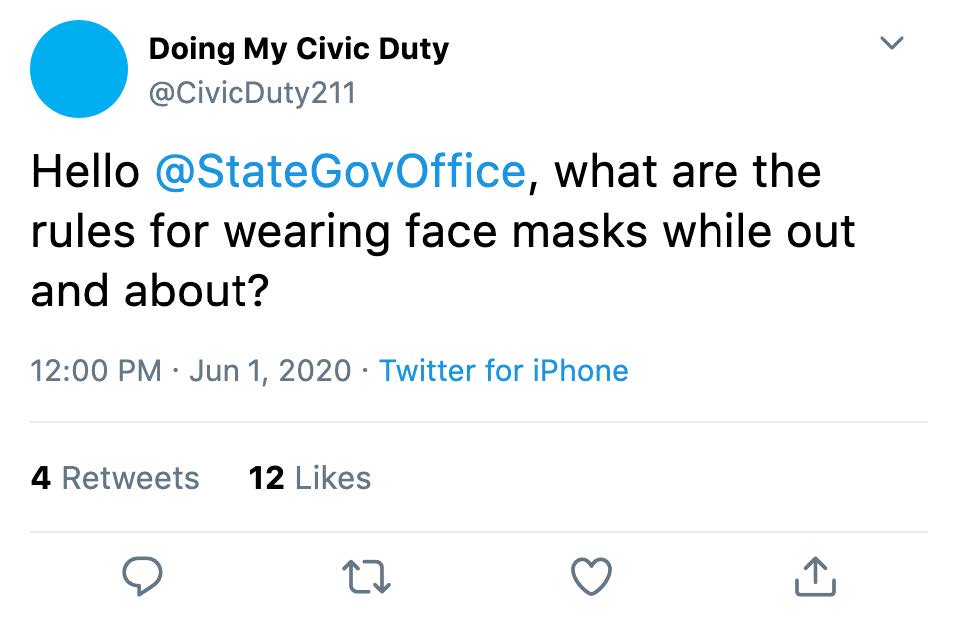In times of crisis, state government needs to be a reliable and responsive outlet to whom constituents can report concerns, ask questions, and receive timely and accurate information.
In response to the COVID-19 pandemic, Catalyst supported the State of South Carolina Governor’s Office with its emergency response plan called “accelerateSC” by way of a Salesforce Service Cloud and Social Studio implementation, as well as a cloud-based call center. These new systems work with each other to collect and manage COVID-19 related inquiries, concerns, and requests submitted by the residents of the State via web form, email, phone call, and social media.
This project was delivered in under 5 weeks, in keeping with the rapid timeline emergencies mandate.
The Public-Facing Channels
The COVID-19 crisis ushered in unprecedented circumstances; in response, the Catalyst and accelerateSC teams were bullish about establishing accessible and modern interfaces through which constituents are already accustomed to requesting services to get in touch with their government amid the pandemic. The channels through which constituents can now submit inquiries, concerns, and requests are email, Facebook, Twitter, a web form, and phone, as we stood up a digital call center with infrastructure supported by Amazon Web Services. A standalone case study about this call center is available upon request.
Note that, upon being submitted, these touchpoints are automatically routed into Salesforce as “cases,” at which point they can be addressed and resolved by customer service agents and departmental subject matter experts.
Deploying Salesforce Service Cloud
The Catalyst team implemented a case management system in Salesforce Service Cloud for accelerateSC in order to house all COVID-19 related cases submitted by citizens. Cases submitted across the public-facing channels include:
- Requests for information about COVID-19 testing sites, essential versus non-essential business protocol, schools and daycares, and volunteer opportunities
- Requests for emergency supplies like PPE
- Complaints (“I can’t get an answer if I can re-open my restaurant or not. What gives?”)
- Concerns (“This saloon is packed, and nobody is following social distancing!”)
- General inquiries

A Knowledge Article in Service Cloud that was created to standardize the response to a question citizens frequently asked: should I wear a mask?
Once routed into Service Cloud, customer service staff triage the concerns among Tier 1 and Tier 2 support agents. Tier 1 agents handle more “straightforward” concerns that do not require niche departmental subject matter expertise for issue resolution. For additional guidance, Catalyst stood up a “Knowledge Base” populated with answers to frequently asked questions (see above) that agents can reference to provide the most accurate and standardized response to constituent inquiries.
To ensure closed-loop communication with constituents during this sensitive time, the Service Cloud backend can also send emails to the submitter notifying them of their case’s updates and ultimate resolution. Meanwhile, on the backend, agents engage with a “contact record” and a “case record” (shown below).

A contact record in the Service Cloud backend houses a constituent’s phone number and email, the history of the State’s interaction
with them, as well as their history of case submissions. Identifying information for the constituent and client has been removed.

A case record includes the submitter’s name and contact information, the category and details of the submission, the State
staffer(s) working to resolve the case, the status of the case, and recent activity and correspondence related to this case’s
resolution. Identifying information for the constituent and client has been removed.
Social to Case
Today, public sector agencies must leverage social media as a channel to engage with their constituency. This is all the more true in an emergency, when constituents demand quick and convenient channels like social platforms to request the information and services they need. In the same vein as email-to-case, web-to-case, and phone-to-case capabilities, South Carolina residents can submit COVID-19 related inquiries and requests via social media, specifically Twitter and Facebook. Leveraging Salesforce Social Studio’s social-to-case functionality, these posts can then be immediately routed to Service Cloud for fast resolution.
On the frontend, South Carolinians can “tag” and direct message (DM) accelerateSC on Twitter and Facebook, asking a question or requesting help. On the backend, the post and/or DM populates in Social Studio. Leveraging backend automation fueled by Salesforce’s Social Studio Automate, posts populate in columns driven by rules and conditions set by the Catalyst and accelerateSC teams. For example, all incoming Twitter mentions and Facebook posts are housed in a separate column than incoming messages and DMs, though in the same Social Studio “Engage” dashboard view. As such, the social team gets a 360-degree view of all activity on a social account and can engage in a back-and-forth with constituents in an organized fashion, as well as send the case to Service Cloud to create a case and allow for the pertinent departments to investigate and resolve the matter. But the benefits of Social Studio stretch beyond social-to-case.

An example of a constituent tweet that could be made a case.
Intersection of Salesforce Social Studio, Social Media and Public Relations
With Social Studio, accelerateSC can now monitor constituent satisfaction with its emergency response on social media channels via social listening functions. These functions provide direct insight into the constituency’s feelings (positive or negative) regarding the response and other relevant topics, allowing the Governor’s Office to adjust its messaging and strategic communications accordingly, as well as schedule regular and emergency social media posts using Social Studio Publish.
Besides technology consulting, Catalyst resources also supported accelerateSC’s public relations efforts to advise upon messaging and framing used in social media posts and DM responses to transparently and effectively respond to and quell constituent feelings of frustration, fear, and anger.
Social Listening and Social Media Management
Using Social Studio’s robust reporting and analytics offerings, accelerateSC can monitor keywords to assess what constituents are saying about a given topic, evaluate constituents’ sentiment associated with that topic, and then use that feedback to inform its ongoing COVID-19 communications plan. For example, if keywords or phrases such as “South Carolina unemployment benefits” is identifying a pull in a lot of posts with a negative tone, the Governor’s Office’s Strategic Communications Team knows it needs to publish more resources to manage expectations better and clarify who receives unemployment benefits and when.
accelerateSC is also leveraging Social Studio’s Publish functionality to regularly post on Twitter and Facebook by sharing COVID-19 related news, resources, and re-opening guidelines. The accelerateSC team builds a content calendar with scheduled posts on a week-by-week basis, but also sends one-off posts to reach a broad audience quickly with emergency information and “breaking news.”
In all, accelerateSC has built “brand recognition” through social media and has solidified its place as a reputable outlet for COVID-19 information.
Notably, reports that were previously pulled manually from social media profiles and inserted into Excel via the native social application’s “Analytics” features are now run automatically in Social Studio and sent to the pertinent stakeholders’ email inboxes every morning as a visually-appealing and comprehensible dashboard. These reports ensure they start their day with an actionable view of the previous day’s activity on socials, as well as historical data of constituent sentiment on various topics related to the pandemic.
End User Training and Post Launch Support
End user adoption is always crucial, and this was deepened with accelerateSC end users given that these systems would be used to support an emergency response. Their self-sufficiency and confidence using the new Salesforce solutions would impact their ability to provide the best customer service possible to South Carolinians during challenging times.
In sum, the Catalyst team trained over 60 users on Service Cloud and Social Studio capabilities via remote training sessions and written training documentation. At all times, we kept it front-of-mind to communicate accessibly to empower end users of all levels of technical confidence with their new systems. To date, we have provided over 80 hours of post-launch support via “war rooms” and one-on-one sessions to ensure system stability and provide a helping hand to end users who had a one-off question or needed assistance while troubleshooting.